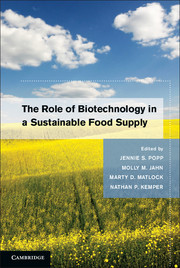The Role of Biotechnology in a Sustainable Food Supply
Langue : Anglais
Coordonnateurs : Popp Jennie S., Jahn Molly M., Matlock Marty D., Kemper Nathan P.

This is a multidisciplinary volume on the use of agricultural biotechnology to provide a sustainable food supply.
A challenge of our generation is the creation of an efficient system providing sustainable food and fuel from the land whilst also preserving biodiversity and ecosystems. We must feed a human population that is expected to grow to more than nine billion by mid-century. Agricultural biotechnology is one tool that holds potential promise to alleviate hunger and poverty. However, there are complex and interrelated scientific, social, political and ethical questions regarding the widespread use of biotechnology in the food supply. This edited volume discusses diverse perspectives on sustainable food production systems in terms of challenges, opportunities, success stories, barriers and risks associated with agricultural and food biotechnology. The effects of biotechnology on the environment, ethical and moral issues, potential changes to government policies and economics, and social implications are summarised. This book will interest students, professionals and researchers from the areas of bioengineering, agriculture and ecosystem science to economics and political science.
1. World population growth and food supply William H. Meyers and Nicholas Kalaitzandonakes; 2. Social challenges: public opinion and agricultural biotechnology Dominique Brossard; 3. Loving biotechnology: ethics considerations Lowell E. Grisham; 4. Biotechnology in crop production Eric S. Sachs; 5. Biotechnology and the control of viral diseases of crops Jason R. Cavatorta, Stewart M. Gray and Molly M. Jahn; 6. Animal biotechnologies and agricultural sustainability Alison Van Eenennaam and William Muir; 7. Genetically engineered crops can be part of a sustainable food supply: food and food safety issues Peggy G. Lenaux; 8. Ecological considerations in biotechnology: ecological concerns and environmental risks at transgenic crops Mark K. Sears and Jeffrey D. Wolt; 9. Organic agriculture as an alternative to a GE-based system Erin Silva; 10. A case study of rice: from traditional breeding to genomics: rice-food for the gods Pamela Ronald; 11. Case study: healthy grown potatoes and sustainability of Wisconsin potato production Alvin J. Bussan, Deana Knuteson, Jed Colquhoun, Larry Binning, Shelley Jansky, Jiming Jiang, Paul D. Mitchell, Walter R. Stevenson, Russ Groves, Jeff Wyman, Matt Ruark and Keith Kelling; 12. Precautionary practice of risk assessment Caroline Baier-Anderson and Michelle Mauthe Harvey; 13. Risk assessment approaches and implications Jose Falck-Zepeda and Anthony J. Cavalieri; 14. The context of biotechnology in sustainable agriculture Marty D. Matlock; 15. Agricultural biotechnology: equity and prosperity Gregory D. Graff and David Zilbeman.
Jennie Popp is a Professor of Agricultural Economics and Area Director of the Center for Agricultural and Rural Sustainability at the University of Arkansas. Her research areas include the economics of water and soil quality, risk management for agricultural producers and assessment of best management practices for agriculture.
Marty Matlock is a Professor of Ecological Engineering and Area Director of the Center for Agricultural and Rural Sustainability at the University of Arkansas. He is a Certified Senior Ecologist with the Ecological Society of America and a Registered Professional Engineer. His research area is in the design and management of ecosystem services, with a focus on water resources.
Nathan Kemper is the TAA Program Coordinator for the Southern Risk Management Education Center. He coordinates the efforts of a team made up of Cooperative Extension Service and SeaGrant faculty and staff and industry representatives in thirteen Southern Region States to develop curricula and deliver training and cash payments to farmers and fishermen to help them adjust their business practices in response to increased import competition.
Molly Jahn is a Professor in the Laboratory of Genetics and Department of Agronomy at the University of Madison, Wisconsin and Special Advisor to the Chancellor and Provost for Sustainability Sciences. She has had a distinguished research career in plant genetics and genomics and plant breeding of vegetable crops, focusing on the molecular genetics of disease resistance and quality traits.
Marty Matlock is a Professor of Ecological Engineering and Area Director of the Center for Agricultural and Rural Sustainability at the University of Arkansas. He is a Certified Senior Ecologist with the Ecological Society of America and a Registered Professional Engineer. His research area is in the design and management of ecosystem services, with a focus on water resources.
Nathan Kemper is the TAA Program Coordinator for the Southern Risk Management Education Center. He coordinates the efforts of a team made up of Cooperative Extension Service and SeaGrant faculty and staff and industry representatives in thirteen Southern Region States to develop curricula and deliver training and cash payments to farmers and fishermen to help them adjust their business practices in response to increased import competition.
Molly Jahn is a Professor in the Laboratory of Genetics and Department of Agronomy at the University of Madison, Wisconsin and Special Advisor to the Chancellor and Provost for Sustainability Sciences. She has had a distinguished research career in plant genetics and genomics and plant breeding of vegetable crops, focusing on the molecular genetics of disease resistance and quality traits.
Date de parution : 01-2012
Ouvrage de 296 p.
18.2x26 cm
Disponible chez l'éditeur (délai d'approvisionnement : 14 jours).
Prix indicatif 103,03 €
Ajouter au panierThème de The Role of Biotechnology in a Sustainable Food Supply :
© 2024 LAVOISIER S.A.S.
